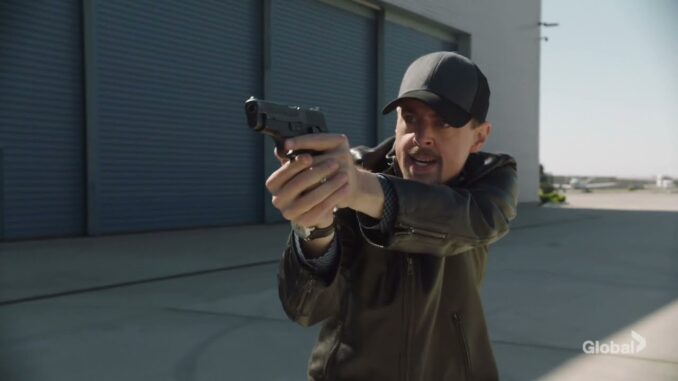
Why Did Gibbs Shoot McGee? The Truth Behind That Shocking Moment
The world of television crime dramas is rife with unexpected twists, but few moments in the long-running saga of NCIS delivered a jolt quite as visceral and perplexing as when Leroy Jethro Gibbs, the stoic, paternal, and fiercely protective leader, inexplicably shot his own agent, Timothy McGee. On the surface, it was an act of shocking betrayal, a violent rupture of the sacred trust that binds the NCIS team. Yet, to dismiss it as mere impulsivity or malice would be to fundamentally misunderstand the complex character of Gibbs and the unwritten code by which he lives. The truth behind that shocking moment is not one of betrayal, but of ultimate, albeit brutal, protection – a grim necessity born from a leader's profound and uncompromising commitment to his people.
The scene itself, in the Season 12 episode "Semper Fortis," was a crucible of tension. A ticking bomb, a compromised structure, and a brilliant but momentarily paralyzed McGee, frozen by the enormity of the threat and the desperate need to disarm it. Time was not merely running out; it was expiring. McGee, focused on a wire, was oblivious to the imminent secondary collapse that threatened to bury him alive, or the greater danger of the bomb detonating directly on top of him. In that split second of horrifying clarity, Gibbs, ever the pragmatist, saw not a loyal agent, but a casualty in waiting. The decision was not pondered; it was instinctual, honed by years of combat, loss, and the heavy burden of command.
His shot, precise and deliberately non-fatal, struck McGee in the shoulder. The immediate aftermath was a flurry of pain, confusion, and a visceral sense of abandonment. For McGee, it was a sudden, searing physical wound compounded by the psychological blow of being targeted by the man he respected and revered above all others. For the audience, it was a gasp-inducing moment, shattering the established dynamic of unwavering trust within the team. The immediate question screamed from every viewer's lips: "Why, Gibbs? Why would you do that?"
The truth, however, lay buried beneath the initial shock. Gibbs didn't shoot McGee to hurt him; he shot him to save him. His bullet was not an act of aggression, but a desperate, surgical intervention. By inflicting a controlled, minor wound, Gibbs achieved several critical objectives. Firstly, and most crucially, he physically propelled McGee out of the immediate danger zone, away from the collapsing debris and the full force of the impending explosion. A direct hit from the shrapnel, or being crushed under the rubble, would have been fatal. Gibbs chose a guaranteed, albeit painful, survival over a highly probable demise.
Secondly, the shot served as a brutal, visceral reset button for McGee's paralyzed mind. In high-stress situations, even the most brilliant minds can seize up. The shock of the gunshot, the sudden jolt of pain, cut through McGee's mental block, snapping him back into action, allowing him to complete the vital task of defusing the bomb just in the nick of time. It was a cruel form of therapy, a forced re-engagement with reality that only a leader as unconventional as Gibbs would dare to employ. He didn't have time for pep talks or gentle nudges; he needed immediate, decisive action, and he achieved it with a single, jarring shot.
Finally, and perhaps most profoundly, the incident illuminated the deepest, most unyielding tenet of Gibbs's leadership: his team's survival always comes first, even if it means he has to be the one to inflict temporary pain or carry the burden of their momentary confusion and resentment. Gibbs is a man shaped by loss, by the unbearable weight of people dying on his watch. He has an almost pathological need to protect his "kids," his agents, from harm, even if it means resorting to extreme measures. His "rules" are not just aphorisms; they are the distilled wisdom of a man who has seen the worst of humanity and has learned that sometimes, the hardest choices are the only ones that keep people alive. The shot was a grim manifestation of "Rule 9: Never go anywhere without a knife," or more accurately, "Rule Whatever It Takes to Protect Your Team."
In the aftermath, the full implications of Gibbs's decision slowly dawned on McGee and the audience alike. The initial sting of betrayal gave way to a grudging, then profound, understanding. McGee didn't just survive; he emerged from the ordeal a stronger, more resilient agent, his trust in Gibbs ultimately deepened by the raw, undeniable proof of his boss's protective instincts. The shocking moment, far from breaking the team, solidified it, illustrating the often-unconventional, yet undeniably effective, bond forged in the crucible of shared danger and unwavering loyalty that defines Gibbs's NCIS.
Thus, the "truth" behind Gibbs's shocking act was not a secret dark side or a lapse in judgment, but the stark, unflinching heart of his character. It was a testament to his unique brand of leadership—a blend of stoicism, brutality, and an unshakeable, paternal love that would do anything, even wound, to ensure the survival of his people. That bullet, fired in a moment of desperate necessity, echoed not with malice, but with the chilling sound of a leader choosing the lesser of two evils, bearing the burden of a painful decision so his chosen family could live to fight another day. It was, in essence, the most "Gibbs" thing Gibbs could ever do.